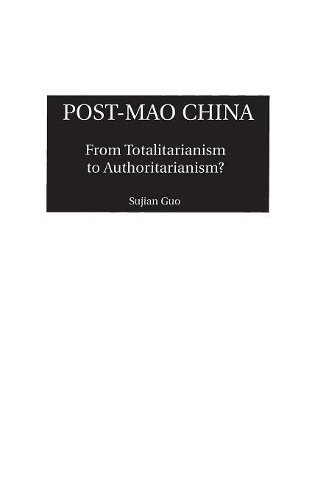
Post-Mao China: From Totalitarianism to Authoritarianism
(Hardback)
Publishing Details
Post-Mao China: From Totalitarianism to Authoritarianism
By (Author) Sujian Guo
Bloomsbury Publishing PLC
Praeger Publishers Inc
30th January 2000
United States
Classifications
Tertiary Education
Non Fiction
Asian history
951.05
Physical Properties
Hardback
240
Description
Guo challenges the predominant view that post-Mao China has moved away from communist totalitarianism and that totalitarianism is an outdated paradigm for China studies. He seeks to reconstruct a plausible macro-model in conceptual and comparative terms for defining regime identity and assessing the nature of regime change. Professor Guo then applies the model to the study of regime change in post-Mao China and reevaluates post-Mao changes across the five major empirical aspects of regime change (political, ideological, economic, legal, and social) and the most critical dimensions of each. The findings of Guo's study demonstrate that the practice of post-Mao reforms remains rooted in and committed to the hard core of Chinese communist totalitarianism and that the regime has attempted to revive many typical totalitarian practices. Most essential or core elements of the idea, practice, and institution of totalitarianism remain essentially unchanged in all major aspects of the post-Mao regime, though the post-Mao regime does suffer from a certain degree of regime weakening in its adjustments of the action means or protective belt of defending the hard core of the communist totalitarian regime. A controversial and essential analysis for scholars, researchers, and policy makers involved with contemporary China.
Reviews
"[Dr. Guo] throws much light on Chinese communist organization and idealogy, and makes a useful contribution to the debate over regime types."-Andrew J. Nathan Professor of Political Science East Asian Institute Columbia University
"Boldly conceptualized and painstakingly researched, this book sheds new light on modern China's historical continuity and change as well as her possible future development.... With great sophistication this book provides a fresh, convincing assessment of post-Mao China markedly different from the established views."-Yen-p'ing Hao Lindsay Young Professor of History University of Tennessee, Knoxville
"This book presents a new assessment of post-Mao changes, with new insight into many controversial issues in the post-Mao Deng's reform....This is a book which is essential to understanding contemporary China. I am pleased to recommend this book to western readers and hope a Chinese version will soon be published in Taiwan or Hong Kong for Chinese language readers outside China."-Hungdah Chiu, Professor of Law School of Law at the University of Maryland Director, East Asian Legal Studies Program President, International Law Association (1998-2000) Ambassador-at-Large of the Republic of China
"Recommended for graduate students and faculty..."-Choice
This is an important book that will be valuable to comparitive political scientists and area specialists in equal measure. They may disagree with its method and conclusions, but they will finish the book having read a convincing and logical argument that is reinforced by a strong commitment to thorough empirical research and analysis.-American Journal of Chinese Studies
""Recommended for graduate students and faculty...""-Choice
"This is an important book that will be valuable to comparitive political scientists and area specialists in equal measure. They may disagree with its method and conclusions, but they will finish the book having read a convincing and logical argument that is reinforced by a strong commitment to thorough empirical research and analysis."-American Journal of Chinese Studies
Author Bio
Sujian Guo is professor in the Department of Political Science and Director of the Center for USChina Policy Studies at San Francisco State University.
